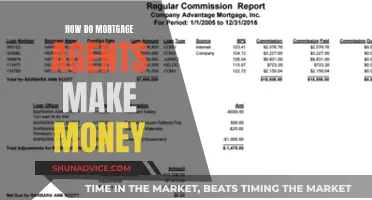
Prepaying your mortgage can be a great way to save money and reduce the term of your loan. However, it's important to consider the potential drawbacks, such as tying up funds that could be used for other investments or financial goals. The best approach for prepaying a mortgage will depend on your financial goals, risk tolerance, and overall financial situation. It's also important to evaluate your entire financial picture and ensure you have a solid emergency fund before making any extra payments. In this paragraph, we will explore the different ways to prepay a mortgage and the potential benefits and drawbacks of each approach.
How do I prepay my mortgage?
| Characteristics | Values |
|---|---|
| Definition | Prepaying a mortgage refers to making extra payments towards the principal balance of the loan, effectively reducing the overall term of the mortgage. |
| Benefits | Prepaying your mortgage can speed up your path to debt-free homeownership, boost your financial stability, and free up cash for other needs or investments. It can also help you build equity faster, reduce your debt-to-income ratio, and eliminate private mortgage insurance. |
| Downsides | Prepaying your mortgage may tie up funds that could be used for other investments or financial goals with potentially higher returns. It may also limit your funds for other expenses. |
| Strategies | You can prepay your mortgage by making extra monthly payments, periodic extra payments, or a lump sum. You can also make biweekly payments, where you split your monthly payment in half and pay every two weeks, resulting in 13 monthly payments per year. |
| Considerations | Before prepaying your mortgage, evaluate your entire financial picture, including your emergency fund, other financial obligations, and investment opportunities. Check for prepayment penalties in your loan agreement and consult a financial advisor to understand the potential savings based on your circumstances. |
What You'll Learn

Prepaying your mortgage: pros and cons
Prepaying your mortgage can be a complex decision that depends on your financial goals, risk tolerance, and overall financial situation. Here are some pros and cons to help you understand the implications of prepaying your mortgage:
Pros of Prepaying Your Mortgage:
- Interest Savings: One of the most significant advantages of prepaying your mortgage is the potential to save on interest payments over the life of the loan. In the early years of a mortgage, a large percentage of your monthly payments go towards interest, and prepaying can help reduce this burden.
- Debt-Free Homeownership: Prepaying your mortgage can lead to the emotional satisfaction of becoming debt-free and owning your home sooner. This sense of achievement and financial freedom can be a powerful motivator for many homeowners.
- Building Equity: When you prepay your mortgage, you increase the equity you have in your home. This can be beneficial if you ever need to access funds through a home equity loan or line of credit.
- Reduced Loan Term: Prepaying your mortgage effectively reduces the overall term of the loan. This means you can become debt-free and own your home much sooner than the original loan term.
Cons of Prepaying Your Mortgage:
- Opportunity Cost: By prepaying your mortgage, you may be forgoing other investment opportunities that could offer higher returns. Investing your money elsewhere may provide a better financial outcome, especially if you can invest in something with a higher interest rate than your mortgage.
- Limited Funds for Other Expenses: Making larger monthly payments towards your mortgage may leave you with limited funds for other financial goals or unexpected expenses. It's important to ensure you have a solid emergency fund and are on track with other financial obligations before committing to prepaying your mortgage.
- Prepayment Penalties: Some lenders charge a prepayment penalty, which is a fee for paying off your mortgage early. It's crucial to review your mortgage contract to understand any potential penalties before making a decision.
- Loss of Tax Benefits: Mortgage interest is typically tax-deductible. By paying off your mortgage early, you may lose the tax benefits associated with mortgage interest deductions, which could impact your overall financial strategy.
- Reduced Liquidity: Prepaying your mortgage ties up money in your home's equity, reducing your liquidity. This may impact your financial flexibility and ability to invest in other opportunities.
Requesting a Payoff: A Guide to Phh Mortgage
You may want to see also

How to prepay your mortgage
Prepaying your mortgage means making extra payments towards the principal balance of your loan, thereby reducing the overall term of the mortgage. This can be done through biweekly payments, periodic extra payments, or a lump sum. However, it's important to evaluate your financial situation and ensure you have an emergency fund before committing to prepaying your mortgage. Here are some things to consider and steps to take if you decide to prepay your mortgage:
Consider the advantages and disadvantages:
Prepaying your mortgage can bring several benefits. It can boost your financial stability, save you money on interest, and help you build equity in your home faster. It can also provide peace of mind by reducing your debt and making it easier to qualify for other financing in the future. However, there are also potential drawbacks. Prepaying your mortgage may tie up funds that could be invested elsewhere for higher returns. Additionally, you may miss out on the mortgage interest tax deduction once the loan is fully paid off.
Check for prepayment penalties:
Some mortgages come with a "prepayment penalty," where lenders charge a fee if the loan is paid in full before the term ends. Review your closing disclosure to verify if there are any prepayment penalties associated with your loan.
Determine the extra amount you can pay:
Calculate how much extra you can afford to pay towards your mortgage each month. You can use online mortgage calculators to estimate the potential savings based on your loan balance, interest rate, and timing and amount of extra payments.
Inform your lender:
Let your lender know that you intend to make extra payments and that you want these payments to be applied to the principal balance, not the interest. This step is crucial, as some lenders may apply extra payments towards future scheduled monthly payments by default, which won't help you pay off the loan sooner.
Make the extra payments:
You can choose to make one-time lump-sum payments or increase your regular monthly payment amount. You can also consider making biweekly payments, which will result in 13 full monthly payments in a year. Additionally, consider putting any unexpected windfalls, such as bonuses or tax returns, towards your mortgage.
Keep accurate records:
It is important to maintain records of the extra payments you make towards your mortgage. This will help you keep track of your progress and ensure that your payments are being applied correctly.
Paying Off Your Mortgage: Strategies for Financial Freedom
You may want to see also

Prepaying vs investing
Prepaying your mortgage means making extra payments towards the principal balance of the loan, effectively reducing the overall term of the mortgage. This can be done through biweekly payments, periodic extra payments, or a lump sum. Prepaying your mortgage can give you peace of mind, as you will own your home outright and won't have to worry about foreclosure or making monthly payments. You will also save money on interest and build equity in your home.
However, prepaying your mortgage may not always be the best financial decision. There are opportunity costs associated with prepaying, as you may miss out on investing your money elsewhere for a higher rate of return. For example, if you have credit card balances or other loans with higher interest rates, it often makes more sense to pay off those debts first. Additionally, once you fully pay off your mortgage, you may lose the mortgage interest tax deduction, which could impact your savings.
On the other hand, investing your money instead of prepaying your mortgage may offer higher returns, especially if you invest in the stock market or other alternative investments. However, investing also comes with risks, and there is no guarantee that your investments will perform well.
Ultimately, the decision to prepay your mortgage or invest depends on various factors, including the terms of your mortgage, your financial situation, and your investment options. It may be a good idea to seek professional financial advice to weigh the pros and cons of each option before making a decision.
Paying Off Your Mortgage Faster: Strategies for Success
You may want to see also

Prepayment penalties
Most borrowers are not subject to a prepayment penalty. However, before making extra payments towards your principal balance, review your closing disclosure to verify that there are no prepayment penalties tied to your loan. You can also ask your lender for a quote for a similar loan without a prepayment penalty so you can compare total costs and make an informed decision.
Under federal law, if your lender can charge a penalty for paying off your home loan early, it can only do so for the first three years of your loan, and the penalty amount is capped. Prepayment penalties are not permitted on single-family FHA loans, VA mortgage loans, or student loans.
Understanding Mortgage Debt: Strategies for Homeowners
You may want to see also

Calculating your savings
There are several factors that will determine how much you can save by prepaying your mortgage, including your loan balance, interest rate, and the timing and amount of extra payments.
You can use a mortgage calculator or consult a financial advisor to help you estimate the potential savings based on your specific circumstances.
One way to calculate your savings is to use a mortgage prepayment calculator. These calculators can help you estimate how much you can save by making extra payments towards your mortgage. You can input information about your current mortgage, such as the loan amount, interest rate, and term, as well as the amount of extra payments you plan to make. The calculator will then estimate how much you can save over the life of the loan.
For example, let's say you have a $400,000 mortgage at a 6.8% interest rate. Your monthly mortgage principal and interest total $2,608. If you make an extra payment of $2,608 every year, you can save a significant amount of money in interest over the life of the loan.
Another way to calculate your savings is to compare the total cost of your mortgage with and without prepayment. For example, let's say you have a 30-year mortgage with a monthly payment of $4,289. If you make additional payments of $1,000 per month, you can pay off your mortgage in approximately 16 years instead of 30 years, saving you a significant amount of money in interest.
It's important to keep in mind that prepaying your mortgage may not always be the best financial decision. There may be other investment opportunities that could provide a higher return on your money. Additionally, you may want to consider building an emergency fund or saving for other financial goals, such as retirement.
- Start prepaying your mortgage as early as possible to maximize your interest savings.
- Make sure your extra payments are applied to the loan principal and not future interest payments.
- Consider rounding up your monthly payments to the nearest $100 to pay off your mortgage faster.
- Use any unexpected windfalls, such as bonuses or tax returns, to make extra payments towards your mortgage.
Making Overpayments on Your Barclays Mortgage: A Guide
You may want to see also
Frequently asked questions
Prepaying your mortgage can save you money on interest, build equity faster, and boost your financial stability. It can also help you own your home sooner, cutting down your debt and reducing your debt-to-income ratio.
Yes, prepaying your mortgage may limit your funds for other investments or expenses. You may also be charged a prepayment penalty, a fee for paying off your mortgage early.
You can prepay your mortgage by making extra payments towards the principal balance of the loan. This can be done through biweekly payments, periodic extra payments, or a lump sum. You must specify that you want the extra payments to go towards the principal, not the interest.
The best time to start prepaying your mortgage is as early as possible. The earlier you make additional payments, the more interest you will save over the life of the loan.







